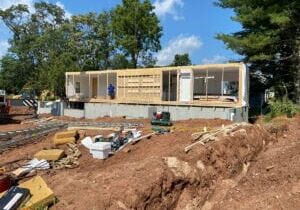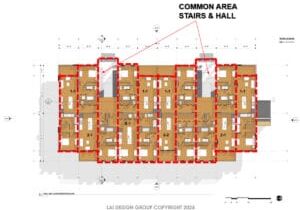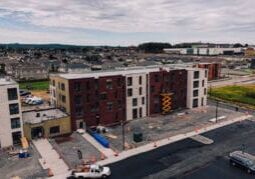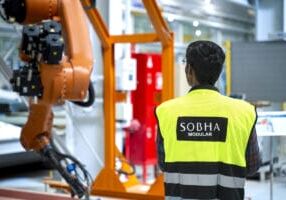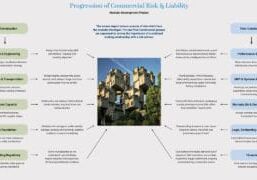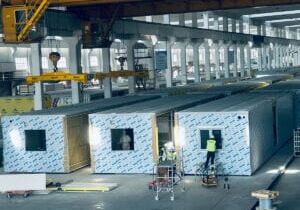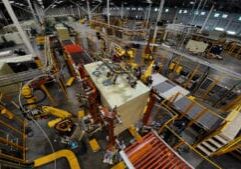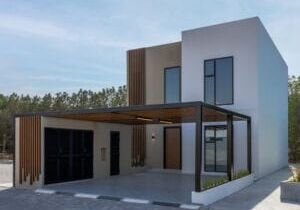ATCO Structures & Logistics LTD. - Temporary Emergency Facility
The Montreal Heart Institute (ICM) temporary emergency building layout, comprising 42 modular units, was carefully planned with various hospital departments to meet the technical and operational requirements to run a busy emergency room. Extra width was added to corridors on the first level to allow for two-way traffic of hospital beds. A variation in floor tile patterns was used to mark bed locations and designated waiting and triage areas. In some areas, the lower half of the walls have an Acrovyn protection panel to minimize wear and tear. Two nurse’s stations were installed complete with a call system for each of the 30 emergency bed locations and washrooms.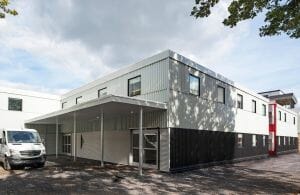
The second level has spacious doctor’s offices. Large windows allow for natural light and contemporary finishes give it a less institutional feel. The install was carefully planned and executed from foundation upwards to meet the Level 02 elevator and corridor link to the hospital.
Because the building is only required for 4-5 years, and being on the neighbor’s property, it was essential the design be modular. The design includes moduleto-module interconnections of all building services to minimize work performed on site. The replacement of surface mounted fluorescent fixtures in the crawl space with DEL lighting provides a more economical and more efficient lighting in a confined space.
Redirecting the exhaust air from the suspended ceilings to the crawl space also provides ICM with a more economical and more efficient solution to heat and ventilate the mechanical crawl space. The use of driven and screwed steel pile foundation also provides for a more economical solution for dismantling at the end of project versus a standard concrete foundation. The “L-Shape” complex had the structural, electrical and mechanical building systems designed to be converted to (8) smaller single-story complexes post project at low cost.
This article originally appeared in the Modular Advantage Magazine - First Quarter 2018 released in February 2018.
More from Modular Advantage
AoRa Development Aims for New York’s First Triple Net Zero Building Using Modular Methods
More cities are providing funding for newer infrastructure projects as long as they meet sustainability requirements. This is how modular can fit the bill, thanks to its lower waste production.
Developers and Designers: Lessons Learned with Modular Design
Modular construction is attractive to many developers because sitework and module construction can occur simultaneously, shortening the schedule and reducing additional costs.
UTILE: Putting Modular Building on a Fast Track
In Quebec, UTILE is taking the lead in creating affordable modular buildings to help decrease the student housing shortage. During the process, the company discovered what it takes to make the transition to modular building a success.
Sobha Modular Teaches Developers How to Think Like Manufacturers
With its 2.7 million square foot factory in UAE, Sobha Modular is bringing both its high-end bathroom pods to high-end residences to Dubai while developing modular projects for the U.S. and Australia.
RoadMasters: Why Early Transport Planning is Make-or-Break in Modular Construction
In modular construction, transportation is often called the “missing link.” While it rarely stops a project outright, poor planning can trigger costly delays, rerouting, and budget overruns.
Navigating Risk in Commercial Real Estate and Modular Construction: Insights from a 44-Year Industry Veteran
Modular projects involve manufacturing, transportation, and on-site assembly. Developers must understand exactly what they are responsible for versus what they subcontract. Risk advisors should research the developer’s contractors, subcontractors, and design-build consultants—especially the modular manufacturer.
Art²Park – A Creative Application of Modular and Conventional Construction
Art²Park is more than a park building—it’s a demonstration of what modular construction can achieve when thoughtfully integrated with traditional materials. The use of shipping containers provided not only speed and sustainability benefits but also a powerful structural core that simplified and strengthened the rest of the building.
Building Smarter: A New Standard in Modular Construction Efficiency
Rising material prices, labour shortages, expensive financing and tightening environmental rules have made conventional construction slower, costlier, and more unpredictable. To keep projects on schedule and within budget, builders are increasingly turning to smarter industrialized methods.
Resia: Breaking All the Rules
Resia Manufacturing, a division of U.S.-based Resia, is now offering prefabricated bathroom and kitchen components to industry partners. Its hybrid fabrication facility produces more precise bathroom and kitchen components (modules) faster and at lower cost than traditional construction. Here’s how Resia Manufacturing does it.
How LINQ Modular Innovates to Bring Modular To The Market in the UAE and Beyond
LINQ Modular, with an office and three manufacturing facilities in Dubai, is a modular firm based in United Arab Emirates. The company is on a mission: to break open the housing and construction markets in the Gulf Cooperation Council (GCC) area with modular.

